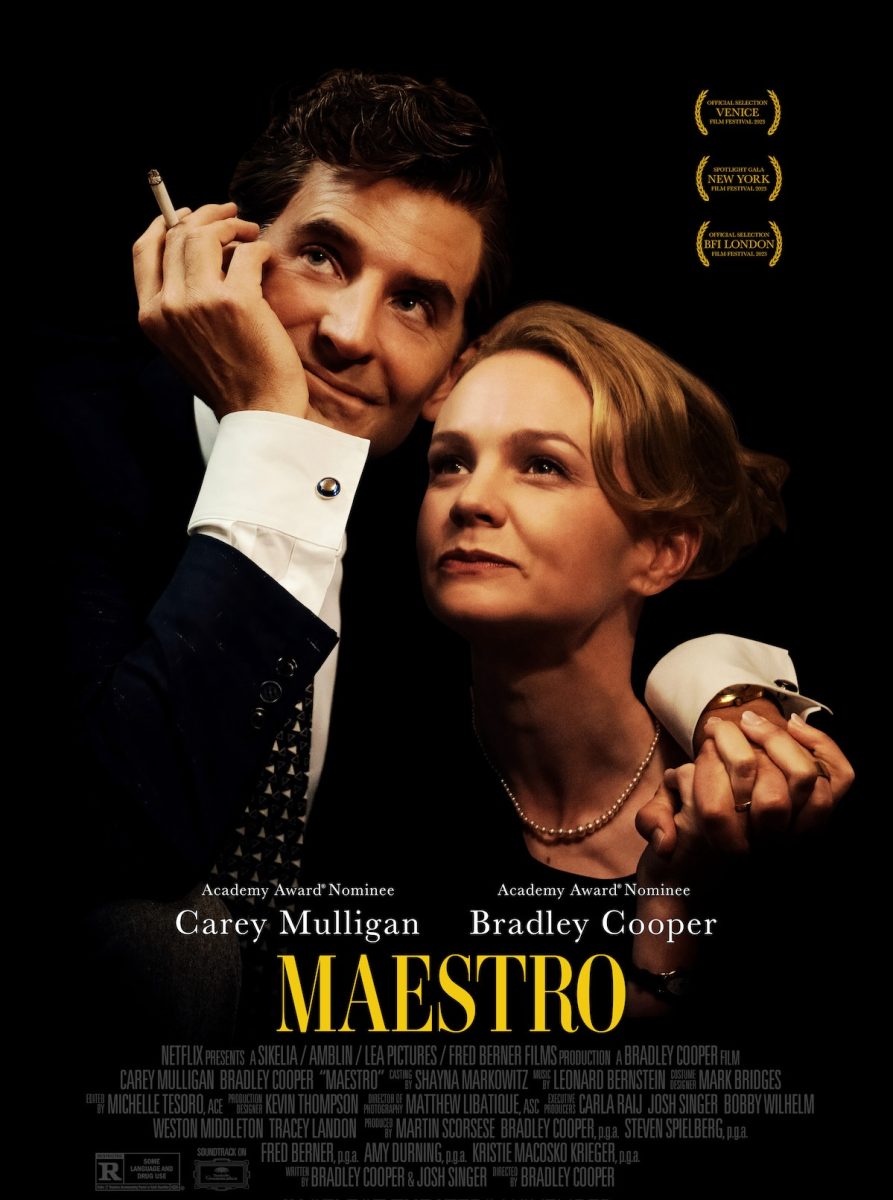
Bradley Cooper and Carey Mulligan star in Maestro, which focuses on Leonard Bernstein’s lifelong relationship with actress Felicia Montealegre Cohn Bernstein. Photo: Supplied.
A love letter to life and art, Maestro at its core is an emotionally epic portrayal of family and love. The two powerful themes that come to the fore are the complexity of marriage and the many forms love can take.
Maestro is an elevating and gutsy love story chronicling the lifelong relationship between Leonard Bernstein and Felicia Montealegre Cohn Bernstein.
Bradley Cooper (American Sniper, Silver Linings Playbook) goes “full Lenny” in his Leonard Bernstein movie, which he directed, co-wrote with Josh Singer, co-produced and has a starring role in.
In 2018, Cooper produced, wrote, directed and starred in the musical romance A Star Is Born, making an impressive directorial debut. The film bagged multiple Oscar and Golden Globe nominations. Cooper played the lead character of a famous country rock singer-songwriter who is battling an alcohol and drug addiction and falls in love with an aspiring singer, played by Lady Gaga.
He repeats his brilliant feat as an actor-director with Maestro, in which he captures the genius of Leonard Bernstein as well as his intricate connection with actor Felicia Montealegre (played remarkably by Carey Mulligan).
At the heart of this ambitious biopic of the world-famous classical conductor and composer is the deep bond he shared with Felicia — even as he had multiple affairs with men. As Bernstein describes themselves, they remained “two little ducks in a pond” through thick and thin.
There is a dreamy quality to their romance, which unfolds in the 1940s and is shown as a flashback, captured in black and white. Their relationship also seems perfect in spite of his demanding career as a composer of several successful operas and Broadway musicals as well as transgressions. The cracks in their relationship appear over some time as Bernstein becomes a bigger celebrity, who hosts lavish parties, with people being obsequious.
Reality is evident as Cooper trained for months to capture Bernstein’s infamously energetic style of conducting. He takes to heart one of Bernstein’s quotes: “I need to conduct with every part of my body, with my shoulders, with my wrists, with my knees.”
Cooper’s enactment in the climactic performance of Mahler’s Symphony No. 2 is wildly physical. He gets Bernstein with every gesture, every facial expression. Cooper intended for a part of the film to be in black and white.
“I knew for the first section I wanted to shoot in 35-millimetre, black and white,” Cooper said. The filmmaker cited inspirations ranging from Ernst Lubitsch to Hal Ashby to Sidney Lumet, all of which come into play as the film moves from the ’40s to the ’80s.
“Working with the crew, and just communicating how important it was that the cinema of this feel like a memory, an imagination of these time periods, was so much fun.”
Maestro, like many recent biopics about the great artists of our past, is more about the man than his art. While it tracks the life of the great conductor, it surprisingly sheds little light on the making of his greatest works, Candide and West Side Story.
Despite that, Cooper creates the best of both worlds, offering a piece of art that serves as a fascinating insight. It combines the refined essence of scintillating celebrity with a showbiz phantasmagoric appearance. Candidly, towards the end, a weepy warmth delivers classic surrealism!
Maestro opens with Bernstein receiving a phone call with the news that he will be conducting the New York Philharmonic at Carnegie Hall that evening, without a rehearsal, as a substitute for Bruno Walter. This would be the conductor’s big break, with the event taking place on 14 November, 1943.
A fearless love story at heart, all the way to its final moments, Maestro features award-winning Bernstein’s stirring compositions, rousing choral music and dramatic portrayals.
”Lenny” thought Felicia was “wonderful, she’s a lovely girl”. As Bernstein said: “If summer doesn’t sing in you, then nothing sings in you. And if nothing sings in you, then you can’t make music … I love people so much that … it’s hard for me to be alone. And music, it keeps me glued to life.”
As well, Felicia knew precisely who Leonard was: “… What age are we living in? One can be as free as one likes without guilt or confession. Please. I know exactly who you are.”
Maestro, directed by Bradley Cooper, Netflix


